
EDUCATIONAL ADMINISTRATION QUARTERLY
Scope & Guideline
Elevating Standards in Education and Administration
Introduction
Aims and Scopes
- Educational Leadership Research:
EAQ publishes studies that explore various dimensions of educational leadership, focusing on how leadership practices impact student outcomes, teacher development, and organizational effectiveness. - Equity and Social Justice:
The journal consistently emphasizes themes of equity and social justice in education, examining how leadership can address systemic inequities and promote inclusive practices within schools and districts. - Policy Analysis and Implementation:
Research published in EAQ often investigates the implications of educational policies at various levels, including federal, state, and local policies, and how these policies affect school leadership and administration. - Collaborative Leadership Models:
The journal highlights the importance of collaboration among educational leaders, teachers, and communities, presenting research on distributed leadership and collective efficacy in schools. - Crisis Management and Resilience:
Increasingly, EAQ addresses how school leaders navigate crises, such as the COVID-19 pandemic, focusing on strategies for maintaining educational quality and supporting student learning during challenging times. - Culturally Responsive Leadership:
EAQ promotes research on culturally sustaining and responsive leadership practices, emphasizing the need for educational leaders to be aware of and responsive to the diverse cultural backgrounds of their students.
Trending and Emerging
- Mental Health and Well-Being:
There is a growing emphasis on the mental health and well-being of both students and educators, with research exploring how school leaders can create supportive environments that promote resilience and psychological safety. - Equity-Focused Leadership Practices:
Emerging research is increasingly focused on equity-centered leadership practices, investigating how leaders can effectively promote social justice and address issues of race, gender, and socioeconomic status within their schools. - Impact of Technology on Leadership:
With the rise of digital learning environments, studies are examining how technology influences educational leadership, including the use of data analytics to inform decision-making and improve school performance. - Community Engagement and Partnerships:
Research is trending towards exploring effective community engagement strategies, highlighting the importance of partnerships between schools and local communities to enhance educational outcomes. - Transformational Leadership in Crisis Contexts:
The role of transformational leadership during crises, such as the COVID-19 pandemic, is gaining traction, with studies focusing on how leaders can inspire and motivate their teams under challenging circumstances.
Declining or Waning
- Traditional Leadership Models:
There has been a noticeable decrease in research focused solely on traditional hierarchical leadership models, as the field moves towards more collaborative and distributed approaches to leadership. - Standardized Testing and Accountability:
Research centered on standardized testing and accountability measures has waned, indicating a possible shift towards more holistic approaches to assessing educational quality and leadership effectiveness. - Generalized Teacher Evaluation Systems:
Studies that explore generic teacher evaluation systems without contextual analysis are becoming less common, as there is a growing emphasis on tailored, context-sensitive evaluation practices that consider individual school environments. - Narrow Focus on Administrative Roles:
Research that solely concentrates on the roles and responsibilities of school administrators without considering the broader educational ecosystem is declining, as there is a push for a more integrative view of leadership. - Single-Dimensional Studies:
The journal has moved away from single-dimensional studies that do not account for the complexities of educational environments, favoring more comprehensive approaches that consider multiple factors influencing leadership.
Similar Journals
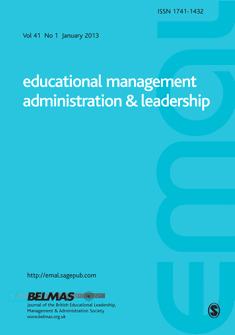
Educational Management Administration & Leadership
Empowering scholars to shape the future of education.Educational Management Administration & Leadership, published by SAGE Publications Ltd, stands as a leading journal in the realms of education and management studies. With an impressive impact factor and distinguished rankings, including being positioned in Q1 in both Education and Strategy and Management categories as of 2023, this journal is dedicated to advancing the understanding and practice of educational leadership and administration. The journal encompasses a broad range of topics, from policy analysis to pedagogical strategies, providing a vital platform for researchers, practitioners, and scholars to publish their findings and insights. With convergence years spanning from 1972 to 2024, Educational Management Administration & Leadership offers rigorous peer-reviewed content that is essential for driving innovation and strategic thinking in educational settings. Researchers can access a wealth of information that not only contributes to academia but also informs practical applications in educational institutions around the globe.
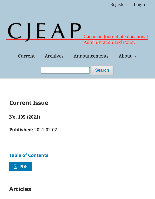
Canadian Journal of Educational Administration and Policy
Empowering Educational Leadership Across CanadaThe Canadian Journal of Educational Administration and Policy, published by the University of Manitoba's Department of Educational Administration, Foundations, and Psychology, serves as a vital platform for scholars and practitioners committed to the enhancement of educational leadership and policy across Canada. With an ISSN of 1207-7798 and an E-ISSN of 1207-7798, this journal actively contributes to the discourse surrounding educational administration and the strategic management of educational institutions. Although currently categorized as Q4 in both the Education and Strategy and Management fields, the journal is poised to foster innovative research that addresses contemporary challenges in education policy and administration, thus encouraging submissions that can elevate its impact and standing. Researchers and students can engage with cutting-edge studies that explore vital themes in educational effectiveness, governance, and reform, as the journal aims to span a converged time frame from 2020 to 2024. Notably, while the journal does not currently offer open access, it remains an essential resource for those invested in the advancement of educational practices and policies in a Canadian context.

Journal of Research on Leadership Education
Advancing leadership knowledge for transformative education.Journal of Research on Leadership Education (ISSN: 1942-7751) is a premier academic journal published by SAGE Publications Inc, dedicated to advancing the understanding and practice of leadership education within the field of education. Established in 2006 and continuing through 2024, this journal provides a vital platform for researchers, educators, and policy-makers to share innovative findings and best practices in leadership development. With its current ranking of Q2 in the education category of the latest journal metrics, and a respectable 60th percentile in Scopus' education rankings, the journal is recognized for its significant contributions to the scholarship on leadership education. Although it does not operate under an open access model, the journal remains highly respected for its peer-reviewed articles, making it a crucial resource for anyone looking to deepen their understanding of leadership within educational contexts. Located in Thousand Oaks, California, the Journal of Research on Leadership Education stands as an influential voice in shaping the discourse surrounding leadership and its impact on educational success.

Pamukkale Universitesi Egitim Fakultesi Dergisi-Pamukkale University Journal of Education
Connecting scholars to shape the future of education.Pamukkale University Journal of Education is a distinguished open access academic journal dedicated to advancing research and discourse in the field of education. Published by DERGIPARK AKAD since 2000, this journal offers a platform for scholars and practitioners to share their findings and innovative practices in education. The journal operates under the ISSN 1301-0085 and E-ISSN 1309-0275, ensuring a broad dissemination of knowledge. Located in Ankara, Turkey, it serves as a vital resource for educational researchers, educators, and policy-makers interested in the latest trends and developments within the educational landscape. If you aim to contribute to the evolution of education through rigorous research or seek to access cutting-edge studies, the Pamukkale University Journal of Education is an essential addition to your academic repertoire.

Multicultural Education Review
Fostering Dialogue on Equity and Diversity in EducationWelcome to the Multicultural Education Review, an esteemed academic journal published by ROUTLEDGE JOURNALS, TAYLOR & FRANCIS LTD. As a prominent resource in the fields of Anthropology and Education, this journal aims to foster the understanding of multicultural perspectives in educational practices. With a robust impact factor and recognition in the Q1 and Q2 quartiles across its categories, the journal offers a vital platform for researchers, educators, and students to share innovative studies and discussions related to multicultural education. Though operating under a subscription model, the journal's content is pivotal for advancing scholarship and dialogue in diverse educational contexts. Since its inception in 2009, the journal continues to shape the discourse on inclusivity, equity, and cultural diversity, ensuring eligibility for a broad readership keen on addressing contemporary educational challenges.
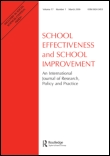
SCHOOL EFFECTIVENESS AND SCHOOL IMPROVEMENT
Shaping the future of education through rigorous scholarship.SCHOOL EFFECTIVENESS AND SCHOOL IMPROVEMENT is a premier academic journal published by Routledge Journals, Taylor & Francis Ltd, dedicated to advancing knowledge in the field of education. With an impressive impact factor and ranked in the Q1 category for Education (2023), the journal plays a pivotal role in shaping educational practices through rigorous empirical research and theoretical insights. It covers a broad spectrum of topics related to assessing and enhancing school effectiveness, making it an essential resource for researchers, educators, and policy-makers committed to improving educational outcomes. With a history of excellence since its inception in 1990, the journal actively fosters discussions on evidence-based strategies for school improvement, thereby contributing significantly to the academic dialogue on optimizing learning environments. Although the journal is not open access, articles are widely available through various academic platforms, ensuring accessibility to its crucial findings.
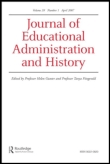
Journal of Educational Administration and History
Advancing Insights in Educational Leadership and LegacyJournal of Educational Administration and History is a prominent scholarly publication dedicated to the exploration and analysis of educational administration practices and historical perspectives in the field of education. Published by Routledge Journals, Taylor & Francis Ltd, this journal boasts an impressive Q1 ranking in both Education and Sociology and Political Science categories, reflecting its high impact and relevance in these fields. With an established history from 1968 to 2000 and continuing from 2010 to 2024, the journal serves as a vital resource for educators, researchers, and policy-makers seeking to understand the intricate dynamics of educational systems through a historical lens. While not currently available as an open access journal, it maintains a commendable position within the academic landscape, holding a Scopus rank of #307 out of 1466 in Sociology and Political Science, and #412 out of 1543 in Education. The journal invites contributions that foster critical discourse and innovative solutions in educational administration, making it an indispensable platform for advancing knowledge and practice in the field.
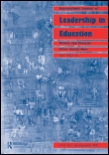
International Journal of Leadership in Education
Exploring the intersection of leadership and learning.International Journal of Leadership in Education is a prominent academic journal published by Taylor & Francis Ltd, dedicated to advancing the study and practice of leadership within educational contexts. Established in 1998, the journal has continuously evolved, contributing significant insights until 2024. With an impressive impact factor and ranked in the Q1 category for both Arts and Humanities and Education, as well as Q2 in Strategy and Management, it stands out as a critical resource for researchers, educators, and policymakers alike. The journal's rigorous peer-review process ensures the publication of high-quality research that informs effective leadership practices in educational settings. While it operates under a traditional access model, its reach is extensive, making it an essential addition to the libraries of scholars and institutions aiming to enhance leadership capabilities in education. Located in the United Kingdom, the journal's global readership benefits from a diverse array of articles that reflect cutting-edge methodologies and theoretical frameworks.
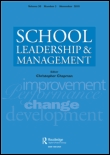
School Leadership & Management
Exploring Cutting-Edge Practices in School LeadershipSchool Leadership & Management is a premier, peer-reviewed journal published by Routledge Journals, Taylor & Francis Ltd, specializing in the expansive fields of education, arts and humanities, and management. With a proud history of publication from 1996 to 2024, this journal stands out in the academic landscape, holding a prestigious Q1 ranking in multiple categories, including Education and Strategy and Management, and achieving remarkable Scopus ranks that place it in the top percentile of its field. Although the journal is not open access, it serves as a vital resource for researchers, educators, and professionals aiming to deepen their understanding of innovative practices in school leadership and organizational management. Its comprehensive scope encompasses theoretical insights and empirical research, fostering an engaged scholarly community dedicated to enhancing educational effectiveness and leadership strategies worldwide. Access to this journal is essential for those committed to advancing knowledge and practice in educational leadership and management.

REICE-Revista Iberoamericana sobre Calidad Eficacia y Cambio en Educacion
Elevating Educational Standards for a Brighter FutureREICE-Revista Iberoamericana sobre Calidad Eficacia y Cambio en Educación is a prestigious academic journal published by the Universidad Autónoma de Madrid, Facultad de Formación del Profesorado y Educación. With a strong focus on enhancing educational quality and efficacy across Ibero-American contexts, this open-access journal has been a beacon for researchers and practitioners since its inception in 2003. It boasts an impressive Q1 ranking in Cultural Studies, Education, and Sociology and Political Science, reflecting its impactful contributions to these fields. The journal is particularly noted for its rigorous peer-reviewed articles, which address critical issues and innovative solutions within educational practices and policies. As a vital resource for scholars, educators, and policymakers, REICE aims to foster dialogue and collaboration that ultimately leads to improved educational outcomes across diverse cultural landscapes. For those interested in impactful research and actionable insights, REICE represents an essential platform for advancement in education.